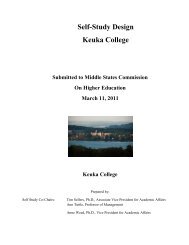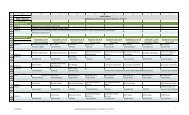final version of the self-study document - Keuka College's Middle ...
final version of the self-study document - Keuka College's Middle ...
final version of the self-study document - Keuka College's Middle ...
You also want an ePaper? Increase the reach of your titles
YUMPU automatically turns print PDFs into web optimized ePapers that Google loves.
In 2011, <strong>the</strong> Office <strong>of</strong> Student Affairs began requiring mentors to submit <strong>the</strong>ir Student <strong>of</strong><br />
Concern Sheet (<strong>document</strong> that identifies students who are struggling socially or academically<br />
and provides details about that issue) on a weekly basis, ra<strong>the</strong>r than 2-3 times in <strong>the</strong> first 6 weeks<br />
<strong>of</strong> school. The Associate Vice President for Student Development follows up with most critical<br />
needs, and referrals are made to o<strong>the</strong>r resources on campus as a result <strong>of</strong> <strong>the</strong> information<br />
contained in <strong>the</strong>se reports (via retention alert module, phone calls and emails).<br />
Student Affairs also began involving Residence Directors (RDs) as Retention Counselors/<br />
Success Advocates in NSO testing dates starting in 2011. RDs attend all <strong>the</strong> NSO events with<br />
parents and students and serve on <strong>the</strong> “How to Parent” Panel. RDs also make contact with<br />
students via residence hall Facebook pages and follow-up with emails to students with questions<br />
and concerns. In 2012, Student Affairs also began assigning RDs to work with specific student<br />
mentors so that <strong>the</strong> RD/Success Advocate relationship can start being built sooner and so <strong>the</strong><br />
mentors can make referrals to specific RDs as issues arise. RDs also introduced <strong>the</strong> role <strong>of</strong><br />
Success Advocates and how <strong>the</strong>y can assist students as part <strong>of</strong> <strong>the</strong> mentor group activities during<br />
<strong>the</strong> June NSO dates.<br />
For Transition Week 2012, Student Affairs staff have also placed a greater emphasis on campus<br />
recreation/intramural opportunities, by expanding time in <strong>the</strong> transition week schedule and<br />
providing a “playtime” opportunity for students to actually experience some <strong>of</strong> <strong>the</strong> recreational<br />
activities (Rec-Fest 2012). Campus Recreation/Intramurals has grown greatly in <strong>the</strong> past few<br />
years and this is ano<strong>the</strong>r way to get students connected early on.<br />
Additional transfer student mentors were added for 2012 as Student Affairs has seen an increase<br />
in comments on NSO/Transition Week surveys concerning transfer student needs. Additional<br />
mentors provide extra support for transfer students and a smaller number <strong>of</strong> students per mentor.<br />
However, transfer students still want a shorter, more comprehensive transfer-only orientation<br />
based solely on transfer needs and not first-time college-student needs. Ideally Student Affairs<br />
would like to have a separate transfer orientation program, but <strong>the</strong>y presently lack <strong>the</strong> staff to<br />
support a completely separate transfer orientation program.<br />
International/Global Education students participate in a three-day orientation preceding<br />
Transition Week, with several activities and events designed to meet <strong>the</strong>ir specific adjustment<br />
needs, particularly transitioning into U.S. culture. Through <strong>the</strong> auspices <strong>of</strong> <strong>the</strong> Center for Global<br />
Education (CGE), a full time International Student Advisor coordinates with <strong>the</strong> Office <strong>of</strong><br />
Multicultural Affairs, multiple departments, and faculty advisors to ensure <strong>the</strong>ir successful<br />
cultural, social, and academic acclimation to living and <strong>study</strong>ing in <strong>the</strong> United States (Appendix<br />
5.16 International Student Orientation Schedule Fall 2012). Community organizations, such as<br />
<strong>the</strong> Sheriff’s Department and Stork Insurance, are also invited to speak with students about U.S.<br />
Law and medical insurance. The Center for Global Education also connects international students<br />
to <strong>the</strong> local community through outreach efforts--transporting students to shopping areas, local<br />
banks, <strong>the</strong> Post Office, and <strong>of</strong>fering students a tour <strong>of</strong> <strong>the</strong> Soldiers and Sailors Memorial Hospital<br />
and <strong>of</strong> Penn Yan, NY.<br />
Students in <strong>the</strong> China and Vietnam Programs participate in Orientation at <strong>the</strong>ir home institutions<br />
through a welcome/overview provided by <strong>Keuka</strong> staff, an improvement implemented in <strong>the</strong><br />
2011-2012 academic year based on assessment by <strong>the</strong> program directors. During this Orientation<br />
session, <strong>Keuka</strong> China Program students are introduced to <strong>Keuka</strong> College, to <strong>the</strong> <strong>Keuka</strong> China<br />
Program, to <strong>the</strong> B.S. Management program, and to <strong>the</strong> concept and practice <strong>of</strong> Experiential<br />
Page 14 <strong>of</strong> 39 Chapter 5: Admissions, Retention & Support




